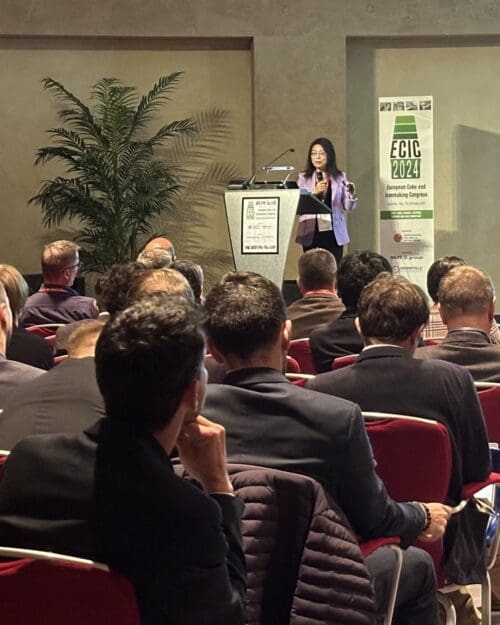CIVS Director Presents Hydrogen Research at European Coke and Ironmaking Congress

 On October 16-18, CIVS Director Chenn Zhou presented at the 2024 European Coke and Ironmaking Congress (ECIC) in Bardolino, Italy. She presented “On the Influence Hydrogen-Bearing Injected Fuels in the Ironmaking Blast Furnace”. Co-authors of the paper include CIVS Graduate Research Assistant Samuel Nielson, CIVS Associate Director of Research Tyamo Okosun, CIVS Research Scientist Orlando Ugarte, and U.S. Steel collaborators Kosta Leontaras and Jason Entwistle.
On October 16-18, CIVS Director Chenn Zhou presented at the 2024 European Coke and Ironmaking Congress (ECIC) in Bardolino, Italy. She presented “On the Influence Hydrogen-Bearing Injected Fuels in the Ironmaking Blast Furnace”. Co-authors of the paper include CIVS Graduate Research Assistant Samuel Nielson, CIVS Associate Director of Research Tyamo Okosun, CIVS Research Scientist Orlando Ugarte, and U.S. Steel collaborators Kosta Leontaras and Jason Entwistle.
Considerable focus has been placed upon the reduction of worldwide carbon dioxide emissions in recent years, and as perhaps the most significant contributor of emissions from steelmaking, the blast furnace deserves careful consideration. Injected fuels have been utilized for decades to reduce blast furnace coke consumption, and hydrogen-bearing injected fuels can also meaningfully cut carbon emissions.
Researchers at Purdue University Northwest’s (PNW) Center for Innovation through Visualization and Simulation (CIVS) have collaborated with members of the Steel Manufacturing Simulation and Visualization Consortium (SMSVC) to investigate the impacts of hydrogen-bearing injected fuels including H2 gas, natural gas, and waste plastic material on the performance of a North American blast furnace. Simulation results have provided a detailed exploration of how flame temperatures, coke rates, and other key conditions are impacted by varying rates of injection. The results can also be used as the basis for physics-based reduced-order models (ROMs) to quickly predict how a given furnace will respond to changing operating conditions.
The ECIC focused on the newest technologies in coke making, sintering, pelletizing, pyrolyzing the biomasses and ironmaking (blast furnaces, direct reduction and carbon-based smelting processes). The 2050 goal of carbon neutrality and the related intensive efforts of the steel industry will significantly affect the technologies for iron ore reduction. In this perspective, the shortage of iron ores matching the requirement for direct reduction by gas and for melting in electric arc furnaces makes an important proposal of new technologies and devices that can ensure carbon neutrality even for coal-based routes.
The Congress focused on technologies that can achieve such a goal by improving the efficiency of the existing process, applying the devices that avoid a net emission of greenhouse gases and pointing out new routes based on the exploitation of biomasses whose net emission is intrinsically neutral.